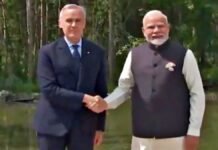
Ottawa: Canadian Minister of Public Safety Dominic A. LeBlanc has spoken out against the display of posters depicting the assassination of India’s former Prime Minister Indira Gandhi at a rally in Vancouver. LeBlanc emphasized that the promotion of violence is unequivocally unacceptable in Canada.
LeBlanc, who also serves as the Minister of Democratic Institutions and Intergovernmental Affairs, addressed the incident on social media platform X. “This week, there were reports of imagery depicting the assassination of Indian Prime Minister Indira Gandhi in Vancouver. The promotion of violence is never acceptable in Canada,” he stated, underscoring the Canadian government’s stance against such displays.
The controversial posters, raised by Khalistan supporters, have sparked a diplomatic dispute. India lodged a formal complaint following the incident, highlighting the recurring issue of space given to Khalistani separatists in Canada.
Indo-Canadian lawmaker Chandra Arya also condemned the use of these posters. Speaking in the House of Commons of Canada, Arya described the posters as depicting “Hindu Indian prime minister Indira Gandhi’s body with bullet holes, with her bodyguards turned assassins holding their guns.” He argued that such imagery attempts to instill fear among Hindu Canadians and is part of an ongoing effort by Khalistan supporters to create an atmosphere of intimidation.
Arya pointed out that this was not an isolated incident, referencing a similar float in Brampton a few years ago and recent inflammatory remarks by Gurpatwant Singh Pannun of Sikhs for Justice. “This is a continuation of threats… and we need our law enforcement agencies to act immediately,” Arya urged.
The issue of Khalistani separatist activities in Canada has been a recurring point of contention between India and Canada. Relations between the two countries have been strained, exacerbated by Canada’s allegations that India was involved in the murder of Hardeep Singh Nijjar, a designated terrorist, in Surrey. India has dismissed these claims as baseless, criticizing Canadian authorities for their lack of evidence.

This incident in Vancouver is not the first to feature violent depictions of Indira Gandhi. In June 2023, a float showing her assassination was part of a martyrdom day parade in the Greater Toronto Area (GTA). Such events continue to strain diplomatic ties between Canada and India.
Adding to the tension, a recent report by a high-level Canadian parliamentary committee labeled India as the “second-biggest foreign threat” to Canada’s democracy, ranking only behind China. This marks an increase in perceived threat level, with India moving up from the third spot in 2019, now ahead of Russia.
Earlier this year, the Canadian Security Intelligence Service (CSIS) released unclassified documents alleging that several countries, including India, interfered in Canada’s elections. These allegations have further complicated the already delicate relationship between the two nations.





















































